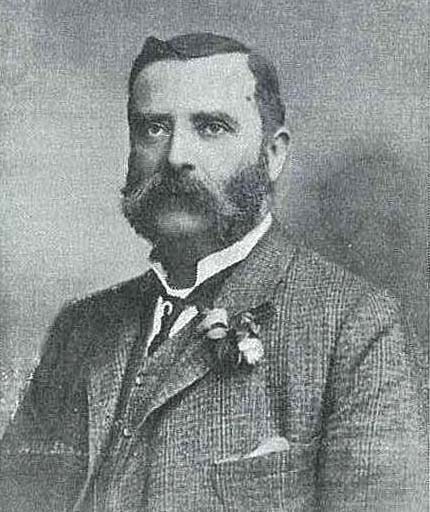By Peter McCullough
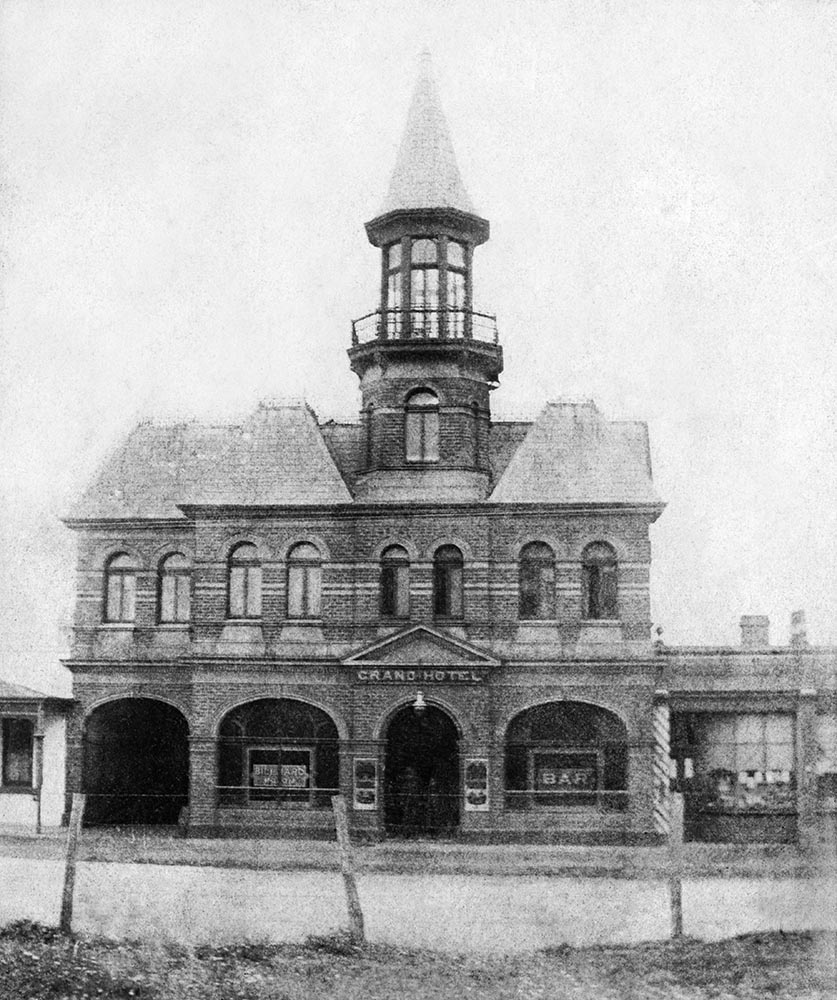
The Grand Hotel has now dominated the Mornington skyline for 130 years. Its colourful history will be brought to you over two editions of Peninsula Essence.
The Early Days
When the Mt. Eliza Roads Board, formed in 1860, proposed the creation of a shire on the grounds that 700 pounds would be available from licence fees for road making, it indicated that the licensees would consist of wood cutters (300 in number), lime burners (150), fishermen (50), and publicans (200). Two hundred hotels on the peninsula when the largest town, Mornington, recorded only 436 permanent residents in 1860? It seems a lot.
It is interesting to note, however, that many of the early hotels still exist. The Tanti, on the corner of Tanti Avenue and the Nepean Highway, was the first licensed hotel in the township of Mornington, and is shown on maps prepared in 1854. A map from November, 1858 shows the Schnapper Point Hotel on the Esplanade; in 1876 it was renamed the Royal Hotel. The same map shows the Mornington Hotel on the corner of Wilsons Road and Brewery Road. It had its own brewery in Brewery Road, later Nunns Road. In 1868 the licence was transferred to a new Mornington Hotel, complete with a decorative parapet of filials and urns, located in Main Street. In 1877 it was renamed the Cricketers’ Arms Hotel.
In 1860 a licence was issued for the Marine Hotel on the Esplanade; in 1873 J. Kirkpatrick took up the licence and it has been Kirkpatricks Hotel ever since. W. E. Pentecost became the licensee of a new hotel (Pentecost’s Hotel) in Tanti Road in 1864; in 1872 it became the Foresters’ Arms Hotel. Around 1860 a man named Scott opened a hostelry named Sailors’ Hotel near Shire Hall Beach. Although the Tanti, Royal and Kirkpatricks Hotels can still be found, the Foresters’ Arms and Sailors’ Hotels have long since disappeared.
Enter The Grand
In the 1880’s opulent coffee palaces sprang up across Australia in response to the temperance movement which sought to promote alcohol-free hotels. Accordingly, in 1889 Cornelius Crowley commissioned prominent architect William Pitt to build the Grand Coffee Palace in Mornington. It must have been a hectic time for Pitt: he had just completed the Princess Theatre (1886), which featured Australia’s first sliding or retractable roof and ceiling, the St. Kilda Town Hall (1887) and the Olderfleet Building (1888) in Collins Street. Nearby he was building the Rialto (1889) as well as the Brunswick Town Hall (also 1889). While these samples of his work remain, others have been lost: the Melbourne Coffee Palace (1879) and the splendid Federal Coffee Palace (1888), subsequently the Federal Hotel, on the corner of King and Collins Streets, which was demolished as recently as 1972. His designs extended beyond iconic buildings and ranged from factories such as Bryant and May (1895) and the Victoria Brewery (1896) to the Queens Bridge across the Yarra (1892). His great talent notwithstanding, he was an unabashed Collingwood supporter and went so far as to design a grandstand, free of charge, at Victoria Park (1892).

Built in a prominent position in Main Street on the site of Mornington’s first hay and corn store and close to the railway station which started receiving visitors in 1889, the Grand Coffee Palace was a two story brick building with three bays and a central tower. Originally an arched carriageway went through to the rear with Swift’s stables on the west side and accommodation built over the stables. It reflected a boom-style enthusiasm for an expanding tourist market. However its life could have been short as The Argus reported on 10 January, 1890 that “…the recently erected Grand Coffee Palace was saved from fire when two shops in Main Street were completely destroyed by the blaze.”
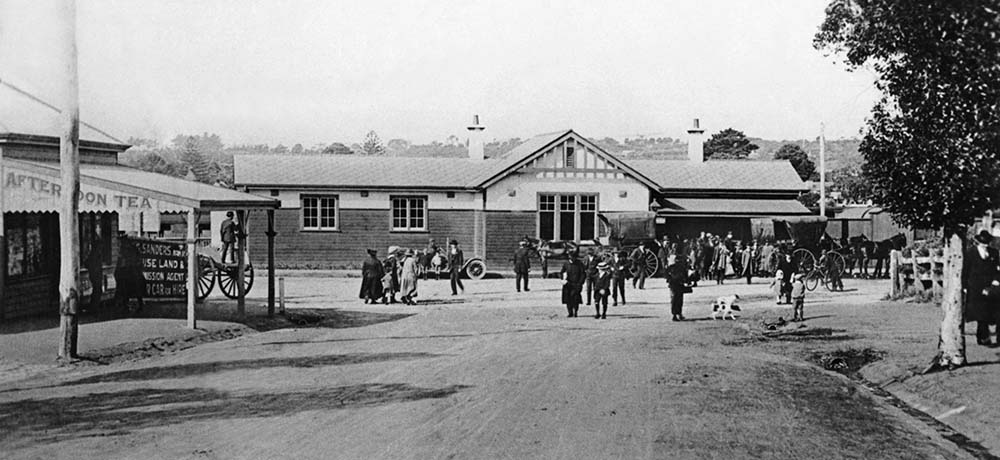
Cornelius Crowley, who had ordered the construction of the Grand Coffee Palace, had earlier become the licensee of the Cricketers’ Arms next door. In 1892, soon after the completion of the Grand, he transferred the licence from the Cricketers’ Arms and renamed his new building the Grand Hotel. The Cricketers’ Arms building then became a car hire and coach depot before being replaced by a garage run by Fred Taylor and Reg Ritchie after they returned from World War One. (Reg was the grandson of Thomas Ritchie who had started a grocery business in Frankston which was the forerunner to the present chain of supermarkets). The building became a furniture store in the late 1940’s and it has since housed various businesses over the years. Today it is occupied by Cotton On clothing after many years as the home of Big Chair Living.
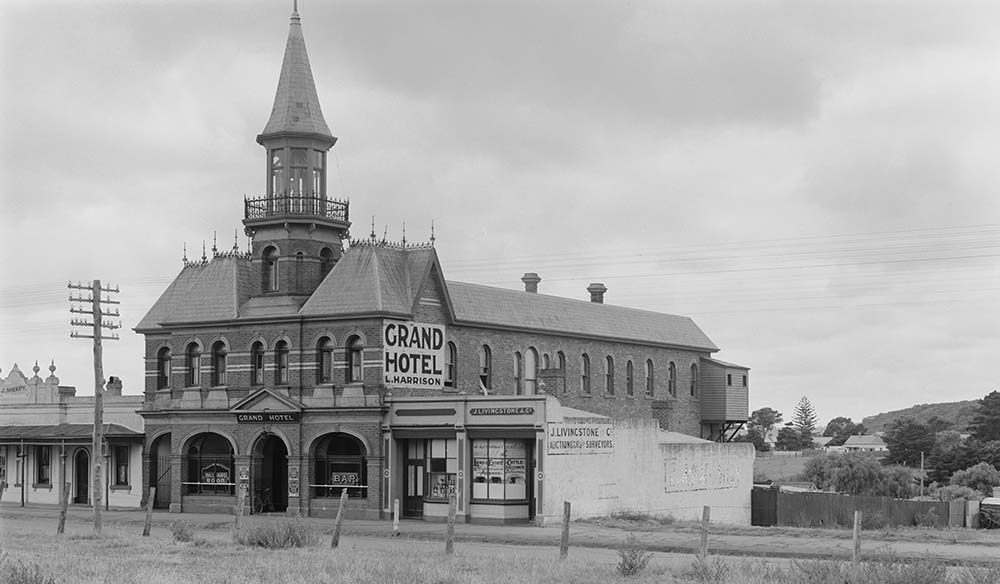
The Grand’s Early Years
Cornelius Crowley owned the Grand Hotel from its construction until World War One with various licensees managing the business during that time. Another threat occurred early one Sunday morning in 1892 when a fire broke out in one of the upstairs rooms. Fortunately it was discovered by one of the occupants who summoned assistance. The Church of England bell was rung to sound the alarm and the startled residents quickly rallied. The fire was contained thereby saving the Grand from destruction.
On 11 July, 1903 the Mornington Standard reported on another mishap: “An appalling flash of lightning accompanied almost simultaneously by thunder struck Mornington on Saturday. The Grand Hotel, which fortunately had a lightning conductor, had a narrow escape from destruction, the tower of which is a prominent object. The lightning removed the conducting rod entirely out of its position, and at the bottom of it, on the ground, it loosened and cracked the asphalt.”
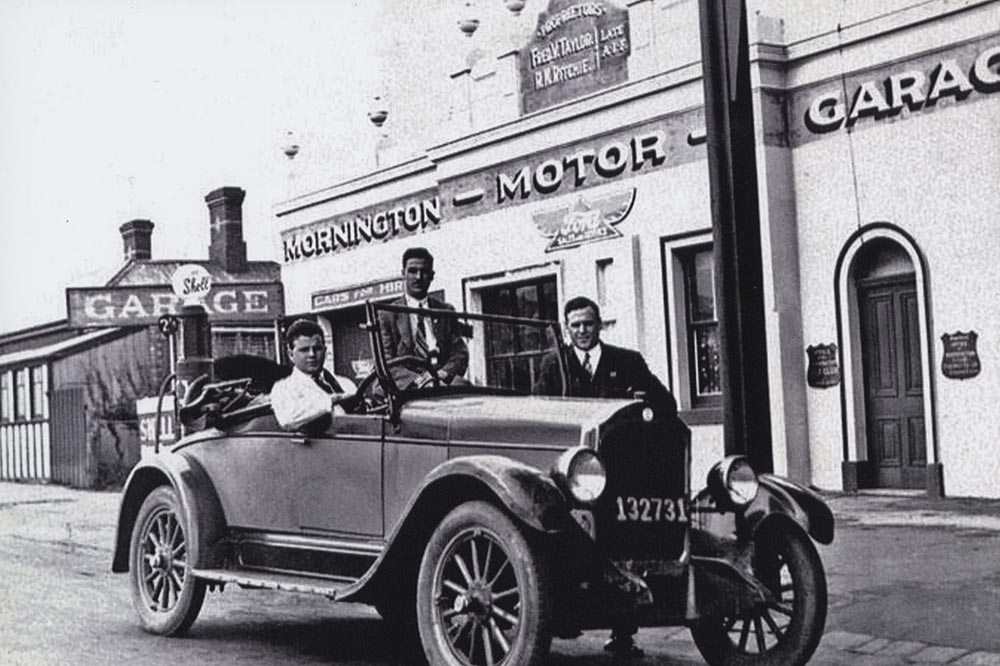
Meanwhile licensees came and went: the licence was transferred to Cecilia Powell (1899), Mrs. S. A. Strong (1902), Owen Connors (1903), James Bowman (1904), and to John Chant (1906) who disposed of the business in May, 1907 to Mary Goldberg for 450 pounds ($900). Six months later Louis Harrison bought the goodwill and effects.
In the early years of the twentieth century Mornington boomed as a picnic destination. A report on the annual Victorian Post and Telegraph Picnic of 1903 gives some idea of the impact of public gatherings at the park and on the township. The event required five special trains to transport the picnickers to Mornington. As well as the Post Office Military Band, the Post and Telegraph Musical Society offered some selections and the “young people” danced to Goodall’s band. A merry-go-round and races were provided for the children and there was a programme of sport. The official party retired to the Grand Hotel for lunch, while some of the picnickers took the opportunity to fish from the jetty or go periwinkling on the shore.
The Harrisons
After the revolving door of previous licensees, the arrival of the Harrison family brought some stability. Lou Harrison had worked for quite a few years as a company accountant and had held the licence of the Motor Club Hotel in Cranbourne prior to moving to Mornington; it would be fair to say that he possessed more business acumen than his predecessors.
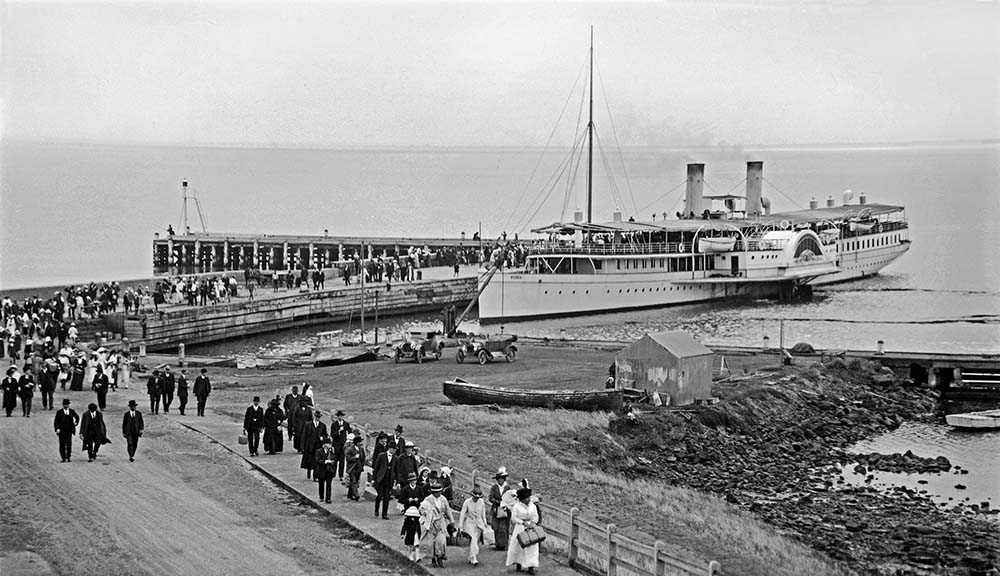
Mornington continued to be a popular place for holiday-makers and day-trippers and in 1907 the Mornington Standard reported that the Woodworkers had travelled down on the Hygeia paddle steamer for their annual sea trip and picnic. It stated that: “…the enthusiasts laid themselves out for a thoroughly enjoyable time, and succeeded admirably. The official dinner was held at the Grand Hotel.” The extent to which the Woodworkers “laid themselves out” is left to the imagination!
Drainage was obviously a problem at the Grand Hotel, but Lou Harrison was across it. In a letter to the editor of the Mornington Standard on 13 July, 1912 he wrote “After perusing the issue of your valuable paper, in reporting the proceedings of the Mornington council meeting, I notice that when discussing the engineer’s report concerning the drain near the railway station, Cr. Grover is reported to state ‘That the owner of the property from which the drainage came should be compelled to construct a septic pit.’ I may state that I think I have one of the best drains in the shire, having at my own expense taken up the original drain in case any blockage should occur, and constructed traps, built of brick and cement, so as to cleanse themselves, and have only to remove red gum covers at short distances to ascertain where any blockage exists. I always use plenty of phenyl, buying nothing less than a cask ranging from 36 to 40 gallons (160-180 litres) at a time, which when diluted will appeal to any reasonable person as to what quantity is used.” Those of us who grew up in the era when the nightman went about his homely task will recall the use of phenyl and its odour.
In October of the following year J. W. Stephens, Inspector of Nuisances, and the Health Officer, Dr. J. L. Edgeworth Somers, reported on the drain at the rear of the Grand: “The proprietor has endeavoured to minimize the evil by plentifully sprinkling with lime, and promised to do all he could in the matter.”
Considering the hotel’s on-going problems with drainage, there is a degree of irony in the fact that, a few years later, E.J. Summers established his plumbing business in the Railway Reserve at the rear of the Grand.
Lou Harrison was very involved in the community, particularly with the local Mornington Football Club of which he was President for three years including the 1915 premiership year. He was also President of the Mornington Peninsula Football Association, and Chair of the Mornington Racing Club; both organizations held their meetings in the Grand Hotel for many years.
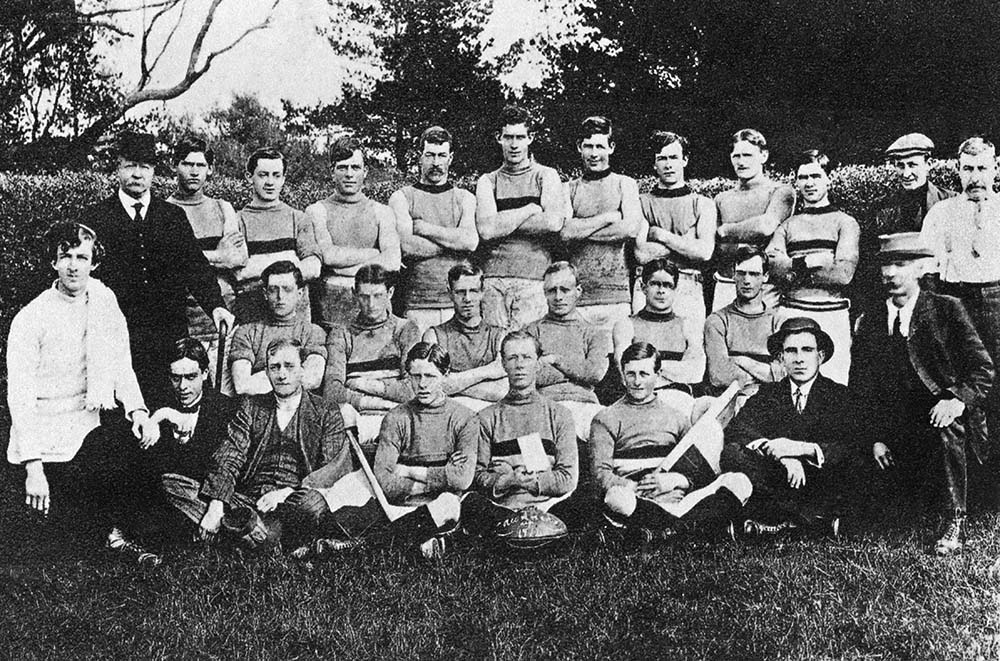
Back Row: W. Hailes (Trainer) (kneeling), Lou Harrison (President), J. Connop, R. Dixon, L. C. Miller, W. Male, S. Sherlock, A. Thompson, W. Sanderson, J. Connell, G. W. Wilson, B. Daw, M. Garlick (Trainer) Centre Row: G. Harrison, H. Golds, A. Taylor, R. Bates, S. Garlick, J. Hutchins. Front Row: L. Garlick, S. Pelling, T. Harrison, L. Harrsion (Captain), P. E. Olsen, E. Byrne, Geo. Sanderson (Kneeling).
Lou and Agnes Harrison had five children: Louis Jr., Alice, George, Tom and Reginald (who died in infancy). Louis Jr., George and Tom all played football for Mornington.
Tom apparently had an interest in greyhounds because he placed an advertisement in the Peninsula Post of 23 June, 1916 stating “Strayed from Mornington-light brown greyhound slut, about 6 months old, scratch on left side of jaw. Reward. T. Harrison, Grand Hotel Mornington.”
Lou Jr. decided not to follow in his father’s footsteps for an advertisement in the Peninsula Post of 20 November, 1914 informed readers that he had “started business” as a painter and paperhanger. George, however, worked for his father in the hotel until he joined the AIF on 18 August, 1914; he was one of the first in Mornington to answer the Empire’s call.
With football in his blood, George participated in an exhibition match of Australian Rules football in the shadows of the pyramids, kicking two goals.
George took part in the first landing at Gallipoli with the 5th Battalion, was wounded at Cape Helles a fortnight later, and invalided to Malta and then Alexandria. Returning to Gallipoli he contracted rheumatism and was moved to Kase-el-nil. After recovering there he was promoted to Sergeant Instructor but gave that up to join his old battalion for service in France as Corporal. Two years exactly to the day of his enlistment George died of wounds received in action in France. He was 22.
A month earlier, in July, 1916 Lou Jr. and Tom had captained opposing sides in a Patriotic Football Match held at Alexandra Park, Mornington. The game could not have been played too seriously for the Peninsula Post reported that the local photographer, Edward Sheedy, had entertained the crowd playing dressed as Charlie Chaplin: “…in the final term, when Charlie Chaplin made his run, it paralysed the onlookers.”
On 26 October, 1916 the Victorian government introduced six o’clock closing of hotels as a wartime austerity measure. This piece of “temporary” legislation remained in force for fifty years and was the bane of publicans. It didn’t take long before it tripped up the locals. In November, 1917, at the local court of Petty Sessions at Mornington, Mr. P. Cohen P. M., and Dr. Somers, Mr. Barrett and Mr. Flood, Justices of the Peace, presided when the licensees of Kirkpatricks, the Grand and the Tanti hotels were charged with having their doors open during prohibited hours. All three were fined: ten pounds ($20) (two charges), five pounds and five pounds respectively with six shillings (60 cents) costs in each case.
The news of the death of Louis Harrison on 20 August, 1918, at the age of 51, came as a painful shock to the community. The Mornington Standard reported that he was “universally esteemed” in that he was connected with, and took an active part in, all the local sporting bodies, and was a prominent figure in any movement for the benefit of the town. He was made a Life Member of the Mornington Football Club in 1921.
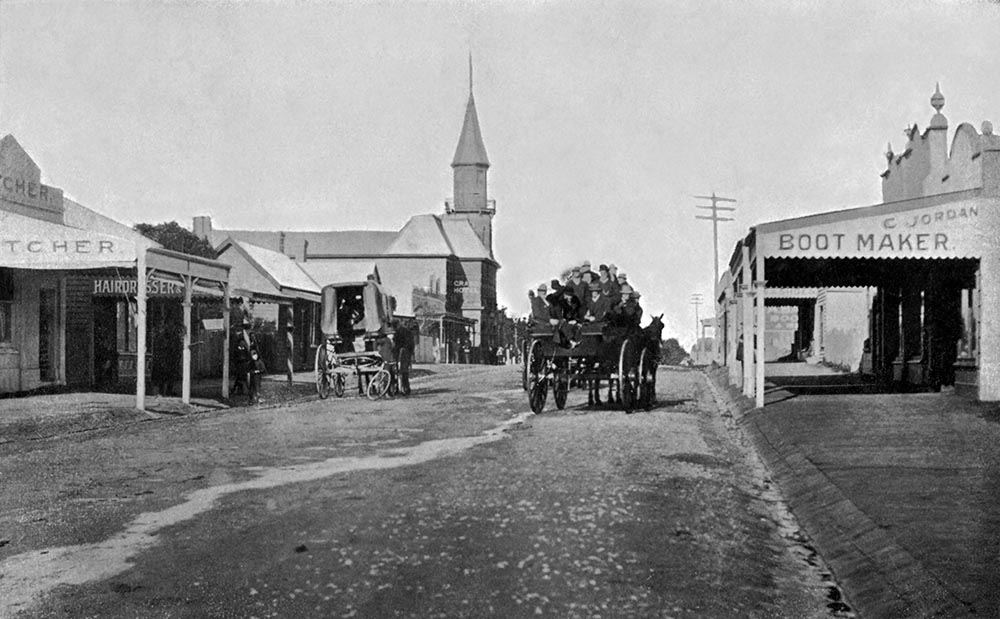
Return of the Revolving door
With the death of Louis Harrison and his son George, the era of the Harrison family drew to a close after 11 years: in December, 1918 Agnes transferred the licence to Dora Garden. In 1919 the Grand expanded to its present size when three matching bays and verandahs were added to the east side. The verandahs were timber, two level and with a shingled skirt-like balustrade, typical of the era. Extensions also added a public bar downstairs and more bedrooms along the front upstairs around this time.
To raise funds for the assistance of returned soldiers, Dora Garden’s husband donated a “handsome silver cup” as first prize in a billiard tournament at the Grand Hotel in 1919. Ten pounds and twelve shillings ($21.20) was raised.
On 16 February, 1920 The Argus reported that at the Mornington Police Court, Dora Garden, proprietress of the Grand Hotel was proceeded against by Inspector Roche of the Health Department for placing an inferior whisky under the label of John Dewar’s Imperial Whisky, and was fined ten pounds ($20) with seven pounds and seven shillings ($14.70) costs.
The writing was on the wall for Dora and in the following month she was replaced by Mr. C. D. Robertson. He promised that this old established hostelry would be conducted to the satisfaction of its patrons. Perhaps Clarence Robertson tried too hard in this respect for on 1 July, 1920 he was before the Mornington Court of Petty Sessions for unlawfully trafficking in liquor and allowing certain persons upon his licensed premises during prohibited times. He was fined three pounds ($6) with eighteen shillings ($1.80) costs.
Clarence must have been a slow learner for on 29 July, 1920 he was fined again: five pounds ($10) with two pounds, one shilling and sixpence ($4.15) costs. This was for “…having failed to have every door leading to the bar on his licensed premises from outside or inside the said premises shut and locked during the hours which the sale or disposal of liquor to the public was prohibited.” He pleaded guilty again in December 1920 to having his bar open contrary the licensing law and was fined five pounds ($10) with two pounds and six shillings ($4.60) costs.
However these indiscretions should not be seen as an indication of Mr. Robertson’s bad character. He was always in the line when donations were required; for example he donated five pounds, five shillings ($10.50) towards the first Mornington Cup, raced for on 4 January, 1921. He was also a great supporter of the local football and cricket clubs, fire brigade and town band. On 1 October, 1920 the Grand Hotel was the scene of a sporting celebration, “…the equal of which had not been seen on the peninsula”; the occasion was the success of Mornington in winning the football premiership.
Although Clarence Robertson had relinquished the management role at the Grand to Florence Helena Downie at the end of 1920, he retained ownership of the property for on 22 December, 1922 the Peninsula Post reported that he was “…another who is helping to make the town buildings more attractive. He has just recently added a new balcony to the hotel at considerable cost, which has made this one of the most up-to-date residential hotels on the peninsula. The hotel is to be sewered throughout in the near future, as well as two new shop frontages adjoining erected, one to be used as a bottle and spirit department.”
On 19 December, 1921 the licence was again transferred, this time to Clarence Robertson’s sister, Mrs. Elsie Harris. In July, 1923 the Peninsula Post reported that the Grand had been connected to the electricity supply: it had “55 lights and 2 power points.” In November, 1925 a wireless set was installed in the Grand Hotel, with a speaker in the bar and another upstairs in the drawing room, “to be controlled by either location, as desired.”
On 28 February, 1927 George Washington Emery (known as “Digger”) took over the licence after leaving the Grand Hotel in Mildura and in April extensive renovations were carried out. The Peninsula Post reported that the hotel had been subjected to “…such a complete renovation that its former licensee would hardly know it. The bedrooms have been freshly plastered and a scene of snowy whiteness in the rooms is visible everywhere. New carpets have been laid; refurnished; a new saloon bar installed; and the introduction of a bottle department supplies a long-felt want locally.”
Mr Emery involved himself with various sporting clubs: the football club celebrated its 1927 premiership with a dinner at the Grand and a special luncheon was served on 23 December, 1928 to celebrate the first match of the newly formed Mornington Peninsula Cricket Association.
William Bernard Coster took over the licence of the Grand on 19 August, 1931 but his term was short-lived as he was replaced by James Louis Nugent on 15 March, 1932. The licence was transferred on 13 February, 1935 to Annie Victoria Ritchie, and yet again on 8 July of that year to John Condren. Mr. J. Sharpe-Brown purchased the freehold in June 1937 with the intention to remodel, and then on 2 August, 1939 James Herbert Maddern took over the licence. In October, 1940 J.H. Maddern was in court charged with the disposal of liquor during prohibited hours and for permitting a person on the premises. Oddly, the first charge was dismissed but the second charge was found proven with a fine of two pounds ($4) and one pound, sixteen shillings and eightpence ($3.67) costs.
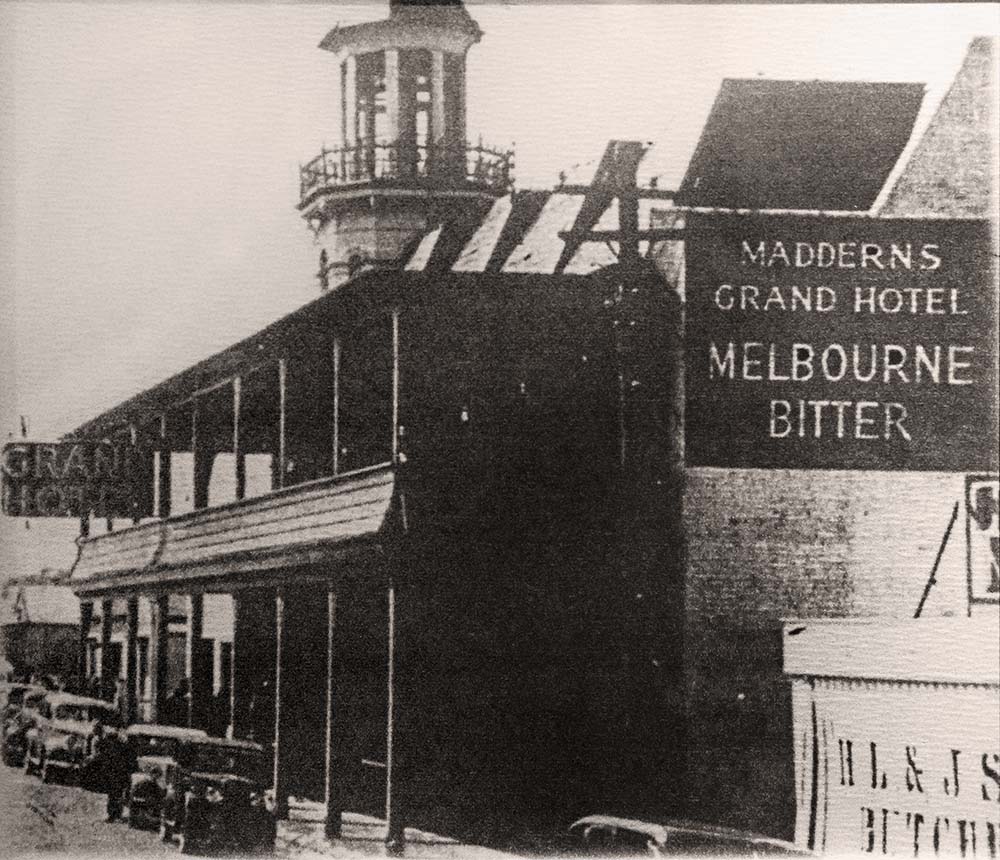
William Randolph Finlayson replaced Maddern as licensee in October, 1940 and two months later he was before the court charged with dispensing intoxicating liquor during prohibited hours and with having persons on the premises in prohibited hours. Six soldiers from the Mt. Martha military camp were charged with being on the premises. Police gave evidence that at 3.10 pm on Sunday 10 November they attended the Grand Hotel and saw six soldiers each with a glass of beer. The licensee claimed the men were bona-fide travellers (i.e. they had travelled more than 25 miles (40 kilometres) and he only admitted them after being informed that the soldiers were from Darley (near Bacchus Marsh). After hearing all the evidence the magistrate dismissed the charge of disposal, but on the charge of having persons on the premises, a fine of three pounds ($6) was imposed with eighteen shillings and eight pence ($1.87) costs. The six soldiers found on the premises were each fined two shillings and six pence (25 cents).
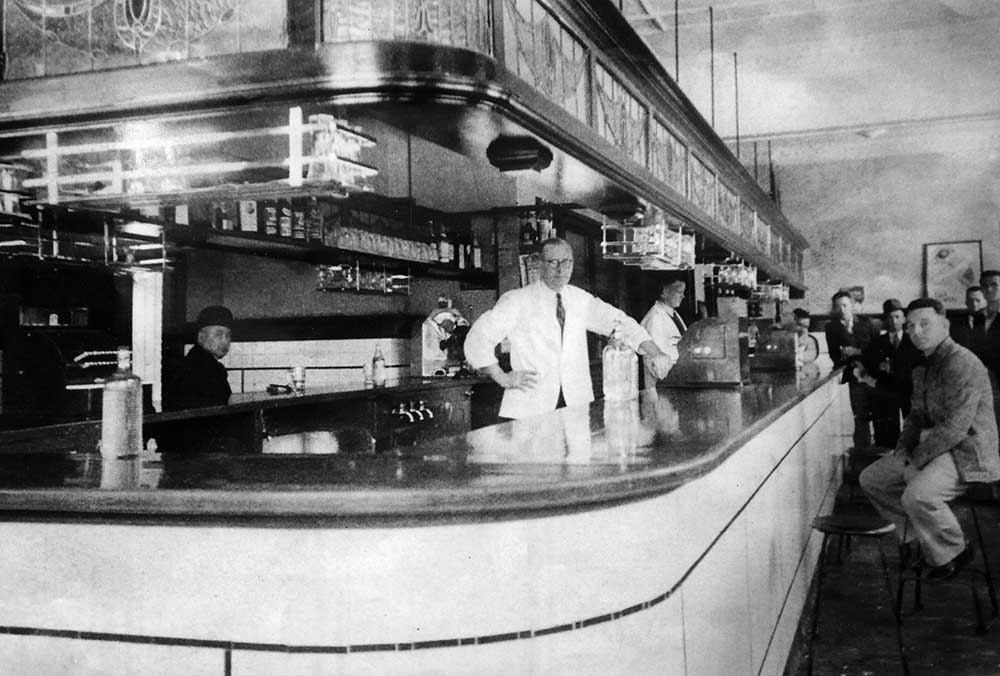
In January 1941 two more soldiers were intercepted on the premises and subsequently fined two pounds ($4) for misrepresenting themselves as bona-fide travellers, plus ten shillings ($1) each for being on licensed premises. Mr. Finlayson had obviously had enough for in March, 1941 proprietorship passed to George Rupert Kanake, and then in December of the same year to Paul Perry Van Suylen (known as “Col”) and his brother-in-law Frank Riley. Col’s grandfather was one of the earliest settlers in Balnarring and had built Warrawee, the district’s first hotel. In February, 1946 the Van Suylens hosted a big meeting which resulted in the revival of the Mornington Peninsula Football League.
During June, 1946 the opportunity of the quiet season was taken to make a number of improvements to the interior and exterior of the Grand. This was the forerunner to the transfer of the licence on 9 August, 1946 to a partnership trading under the name of Grieves and Aitken. In the following year the Grand hosted a dinner in May which led to the formation of the Mornington Chamber of Commerce, and another dinner in October which was a reunion for old footballers.
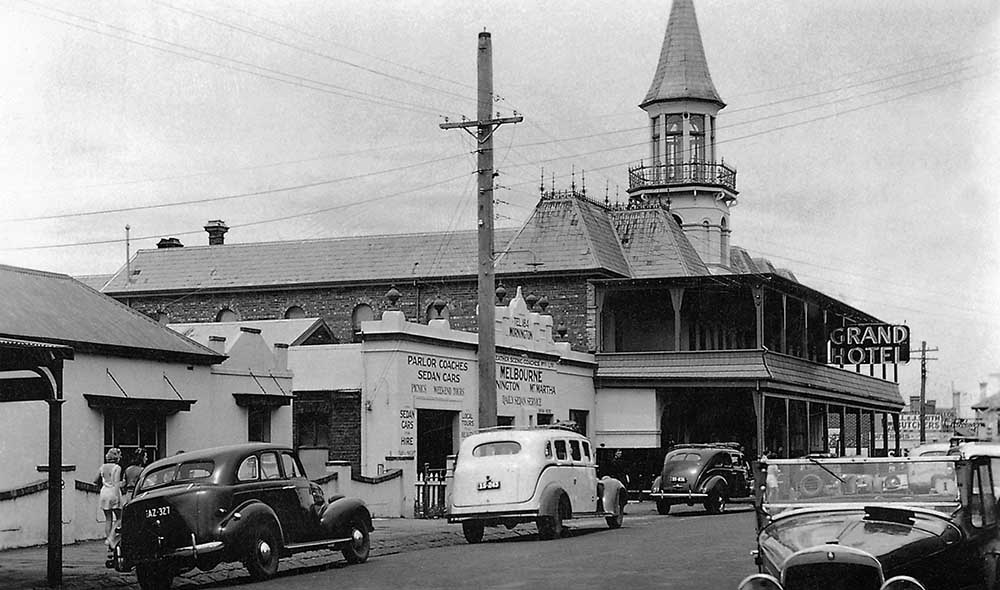
…To be continued in September 2019 edition of Peninsula Essence
Peninsula Essence – August 2019

